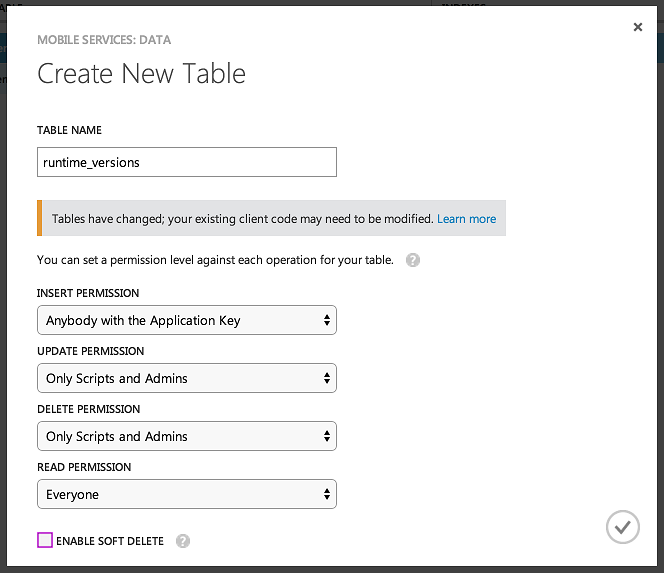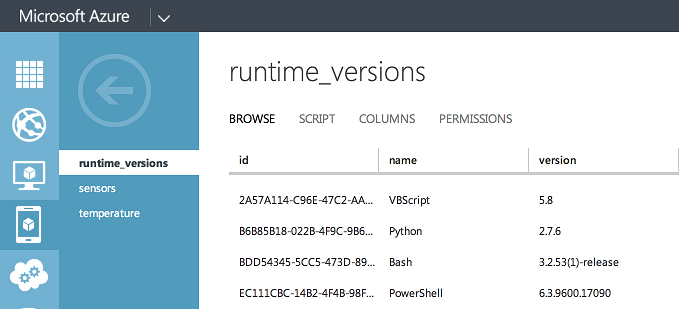In my opinion, Azure Mobile Services is not talked about nearly enough. In many of the projects I have worked on, the ability to create a REST API within minutes and consume it within my scripts is incredibly useful.
For this post I am going to assume you have a basic knowledge of Azure Mobile Services - enough to create a service, table and define two columns. If you need some help, click here to get started.
By the end of this post you should have some insight on how to easily 'cloud enable' an existing script. I will try to keep it as simple as I can without using external libraries where possible.
Our scenario will be a simple app that reports the language runtime and version to an Azure Mobile Service.
Setup
A basic table will need to be created in your Mobile Service. We want to allow anyone with the application key to be able to insert. We'll allow anyone to retrieve this data.

Create two columns both of String type called 'name' and 'version' respectively.
Index
Bash
#Set up service URL, token and data
url="https://kiwiot.azure-mobile.net/tables/runtime_versions"
application_key="jpZgynEqcTHISISAFAKEKEYWwhOxeo21"
runtime_name="Bash"
runtime_version=$BASH_VERSION
post_data="name=${runtime_name}&version=${runtime_version}"
post_headers="X-ZUMO-APPLICATION:${application_key}"
#POST data to Azure
curl $url -X POST --data $post_data --header $post_headers
PowerShell
#Allow us to URL encode our data
Add-Type -AssemblyName System.Web
#Set up service URL, token and data
$url = "https://kiwiot.azure-mobile.net/tables/runtime_versions"
$application_key = "jpZgynEqcTHISISAFAKEKEYWwhOxeo21"
$runtime_name = [System.Web.HttpUtility]::UrlEncode("PowerShell")
$runtime_version = [System.Web.HttpUtility]::UrlEncode($PSVersionTable.BuildVersion)
$post_data = "name=" + $runtime_name + "&version=" + $runtime_version
$post_headers = @{"X-ZUMO-APPLICATION"=$application_key}
#POST data to Azure
Invoke-WebRequest $url -Method POST -Body $post_data -Headers $post_headers
Python
For Python we will be referencing a library called requests.
import requests
import string
import sys
#Set up service URL, token and data
url = "https://kiwiot.azure-mobile.net/tables/runtime_versions"
application_key = "jpZgynEqcTHISISAFAKEKEYWwhOxeo21"
runtime_name = "Python"
runtime_version = string.split(sys.version, ' ')[0]
post_data = {'name' : runtime_name, 'version' : runtime_version}
post_headers = {'X-ZUMO-APPLICATION' : application_key}
#POST data to Azure
response = requests.post(url, data=post_data, headers=post_headers)
VBScript
'Create a function to POST with
Function AzurePOST(sUrl, sData, sKey)
set oHTTP = CreateObject("Microsoft.XMLHTTP")
oHTTP.open "POST", sUrl, false
oHTTP.setRequestHeader "Content-Type", "application/x-www-form-urlencoded"
oHTTP.setRequestHeader "Content-Length", Len(sData)
oHTTP.setRequestHeader "X-ZUMO-APPLICATION", sKey
oHTTP.send sData
HTTPPost = oHTTP.responseText
End Function
'Set up service URL, token and data
url = "https://kiwiot.azure-mobile.net/tables/runtime_versions"
application_key = "jpZgynEqcTHISISAFAKEKEYWwhOxeo21"
runtime_name = "VBScript"
runtime_version = ScriptEngineMajorVersion & "." & ScriptEngineMinorVersion
post_data = "name=" & runtime_name & "&version=" & runtime_version
'POST data to Azure
AzurePOST url, post_data, application_key
Conclusion
It is straight forward enabling reporting/telemetry/storage of data from your scripts. Independent of platform! The next blog post will show how to consume this data.

Comment below if there are other languages you would like to see here.
Jourdan